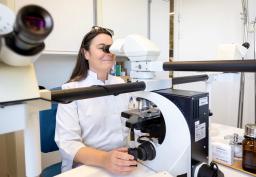Clinical chemistry is a pillar of patient care
Keywords:Clinical chemistry plays an important role in both diagnostics and the planning and monitoring of treatment. The diversity of the field even surprises many professionals.

Chief Physician Anna Lempiäinen was swept along by clinical chemistry 20 years ago.
Clinical chemistry includes most of laboratory tests, but the field is still unknown to many. In fact, Chief Physician Anna Lempiäinen often calls herself 'a laboratory physician', which better describes the job of a specialist in clinical chemistry.
"We make sure that laboratory tests are reliable and that the selected tests are appropriate. A large part of the job is to provide medical opinions on specific tests. We also answer any questions that clinicians may have," she says.
Everything starts with diagnostics
Clinical chemistry plays an important role in planning the patient’s treatment, as many treatment decisions are based on the results of laboratory tests.
"Everything starts with diagnostics. Naming the illness and then, based on it, finding the right treatment for the patient,” says Lempiäinen.
Lempiäinen herself mainly works in laboratory hematology. Laboratory hematology involves diagnosing illnesses such as blood cancers and other blood diseases and monitoring the residual diseases of blood cancers. Residual diseases refer to diseases that have not been fully cured after treatment and that have left small amounts of themselves in the body.
Clinical chemistry also plays an important role during treatment in ensuring that the patient receives the correct treatment with the correct intensity. For example, during treatments for blood cancer, a bone marrow sample is taken at specific intervals and tested for whether it still contains the disease.
"If the disease remains, a specific kind of treatment will be given, and if the disease is no longer found, we will continue on another path," Lempiäinen explains.
Clinical chemistry offers versatile career opportunities
Research in clinical chemistry is constantly used to develop patient care. The opportunities to advance in your career are versatile, and you can choose your field according to your own interests.
For example, you can focus on working in an automation laboratory where the majority of samples coming to the laboratory are analyzed, or special analytics, such as blood center work, hematology studies, metabolism studies or other special analytics.
Anna Lempiäinen feels that the best part of her work is its challenge and the wonderful colleagues.
"We work closely with clinicians to provide patients with the best possible service. We know that we are an important part of patient care."
For Lempiäinen, each day as the chief physician of hematology is different.
"Most of the time I do clinical work, even though I spend some of my time on administrative matters. In addition to hematology, I have other areas of responsibility, such as the stem cell laboratory, which is a key support service for units that perform stem cell transplantations."
Swept along by clinical chemistry
Lempiäinen has worked in clinical chemistry for almost 20 years. She started specializing in the field partly because of her life situation at the time.
"I wanted a job without on-call duties. This is a nice office job with regular hours. While specializing, I realized how diverse this field is, and clinical chemistry swept me along."
However, clinical chemistry as a concept may still cause amusing situations.
"Some time ago, my acquaintance asked me something because they thought I was 'a clinical chemist'." No, I’m still a physician,” says Lempiäinen, laughing.